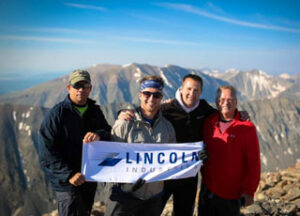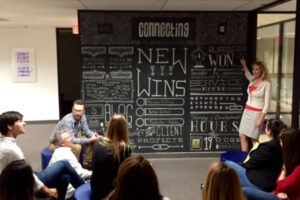Guest post by Gerald Wagner.
What if you’d wake up on Monday excited to go back to work? Organizations with “Whole Person Cultures” make this a reality. Not because they offer happiness courses and wellness perks – but because they create organizational cultures in which people thrive. Eliminate fear, add creativity. No need for office politics, if there’s openness. Bye professional masks, hello authenticity. Why use key performance indicators and stretched targets, if you get it done through enthusiasm and work-life balance. It’s a magic mix so let’s meet some organizations that walk this talk!
The past years have seen an explosion of articles, books, workshops, and webinars on organizational culture, engagement, wellbeing, wellness and happiness. The media released countless rankings of the “Best Places to Work”. Many companies have invested substantially in perks such as gymnasiums, bonuses, food, cabins, and trips. Included are the “wellness” programs” that show a shocking lack of usage. On average, only 24% of employees participate in these programs, and only 12% believe improve their overall wellbeing. Too many companies focus on physical health but fail to address the entirety of a person’s experience (Gallup Business Journal, February 4, 2015). The lesson is clear: too many companies focus on physical health but fail to address the entirety of a person’s existence.
As Gallup Business Journal wrote: “Developing thriving employees requires taking a whole-person approach. After all, employees bring every aspect of themselves to work each day.”
Fortunately, more and more publications are talking about the “whole person”. They focus on empathy, emotional intelligence, compassion, mindfulness, love, joy, gratitude, virtuousness, kindness, and dignity to describe employee wellbeing and success.
Any organizational culture strategy needs to echo a “Whole Life Organizational Culture” approach. It needs to include the traditional perks and benefits along with addressing employees and their families, customers, suppliers, advisors, owners, and the community as a whole.
But what does a “Whole Person Culture” look like? The Institute for Inspired Organizational Cultures (IOC) aims to develop a global community of leaders who are advocates for organizational cultures of wellbeing and happiness. Let’s shine a spotlight on some companies and individuals that make life at work better.
Coding ZEAL company
The wildly successful company Coding ZEAL in Medford, Oregon, hires for culture fit and empathy. They don’t necessarily hire for current talent. If there is talent, that becomes an added benefit. Coding skills and algorithms can be taught; empathy, zealotry, and excitement must come from within. You can read more about ZEAL in this blog post.
Nearsoft
Nearsoft in Hermosillo, Mexico and San Jose, California believes in an environment that eliminates fear. Fear kills creativity and impedes entrepreneurship. They have a governance framework for decentralized decision making where teams are free to address any issue they care about, from organizing offsite team building to how bonuses are distributed. All company data including salaries is open and available to all employees. Watch the Nearsoft video here.
Bob Chapman and Barry-Wehmiller Inc.
 Bob Chapman imagines a world where people leave work each day truly fulfilled. His vision includes creating caring work environments that allow people to realize their gifts, apply and develop their talents, and feel a genuine sense of fulfillment from their contributions. In this world, people go home happy and become better spouses, parents, neighbors, and friends because their work is so satisfying.
Bob Chapman imagines a world where people leave work each day truly fulfilled. His vision includes creating caring work environments that allow people to realize their gifts, apply and develop their talents, and feel a genuine sense of fulfillment from their contributions. In this world, people go home happy and become better spouses, parents, neighbors, and friends because their work is so satisfying.
As Chairman and CEO of the $2 billion capital equipment and engineering solutions firm Barry-Wehmiller in St. Louis, Missouri, ChapmanBob has championed meaningful employment and a compassionate environment through his commitment to Truly Human Leadership. The firm has even implemented a recognition program where team members nominate and celebrate their peers as great examples of leadership.
Lincoln Industries
 Lincoln Industries in Lincoln, Nebraska surely qualifies as a role model. They have been named one of the 25 Best Medium Companies to Work For in America six times, and there’s no secret as to why. The culture at Lincoln Industries is unique. They have six key culture elements including wellness. They particularly encourage healthy lifestyle choices and a good balance between work and home life.
Lincoln Industries in Lincoln, Nebraska surely qualifies as a role model. They have been named one of the 25 Best Medium Companies to Work For in America six times, and there’s no secret as to why. The culture at Lincoln Industries is unique. They have six key culture elements including wellness. They particularly encourage healthy lifestyle choices and a good balance between work and home life.
A leader in wellness programs, Lincoln Industries, continues to outdo itself with the record-breaking accomplishments of their people in accomplishing individual wellness goals. 2014 was a record-setting year with over 300 people qualifying for the annual company mountain climb of which 132 people joined in climbing Quandary Peak in Colorado. Of these, 43 people were first-time climbers. This year (2015) will mark ten years since Lincoln Industries began the company climb as a way of recognizing people for their wellness accomplishments, and the organization pays all climb expenses.
Marketwave
 Do great work and have fun while you’re at it! That’s what the integrated marketing agency, Marketwave, in Dallas believes. CEO Tina Young says happy, engaged employees lead to consistently better results for clients. Her company has thrived by putting employees first while building a culture based on servant leadership and a unique brand of Texas tenacity.
Do great work and have fun while you’re at it! That’s what the integrated marketing agency, Marketwave, in Dallas believes. CEO Tina Young says happy, engaged employees lead to consistently better results for clients. Her company has thrived by putting employees first while building a culture based on servant leadership and a unique brand of Texas tenacity.
The main driver for this focus on culture is Tina’s involvement in a growing national business movement called Conscious Capitalism. This movement believes the place to start is with the idea of “why you do what you do” In other words, understanding your company’s purpose. When a team engages with this reason, it elevates their work and translates into greater fulfillment.
The company’s six values are employee’s first, trust, service mindset, recognition, daily intensity and giving back. Given the accomplishments of Marketwave’s employees, it’s clear that it embodies these values.
Balle
Balle (Business Alliance for Local Living Economies) started 15 years ago and includes 50 of Oakland, California’s most inspiring business founders, leaders, investors, and organizers. These participants were invited to join the Well-Being in Business Lab because the host committee recognized them as embodying the future of wellbeing. These are leaders who are moving beyond a me-centric mentality and towards a more collective attitude that emphasizes well-being for all.
• What is your takeaway? What will you apply to your work life?
Gerald R. Wagner, Ph.D. is a software entrepreneur, statistician, and simulation modeling technologist turned behavioral scientist. He is the founder of the Institute for Inspired Organizational Cultures
Do you like this post? Please help me spread positivity by tweeting, sharing, and liking.
Marcella Bremer is an author and culture & change consultant. She co-founded this blog and ocai-online.com.
One Response
The article talks about whole person organizational cultures being those “in which people thrive. Eliminate fear, add creativity. No need for office politics, if there’s openness. Bye professional masks, hello authenticity.” Too good to be true? My thoughts exactly!
Until recently, terms like “servant leadership” & “whole person organizational culture” were unknown to me. Having come across them, I started reading up and discovered that there is a buzz out there and “more and more publications are talking about the whole person. They focus on empathy, emotional intelligence, compassion, mindfulness, love, joy, gratitude, virtuousness, kindness, and dignity to describe employee wellbeing and success.”
Enlightened companies & change leaders, “who are advocates for organizational cultures of wellbeing and happiness”, are trying to spread the message & make a difference, one step, one team, one organization at a time….and I just love it…..”the journey of a thousand miles begins with one step.” Thank you Marcella for sharing this…..